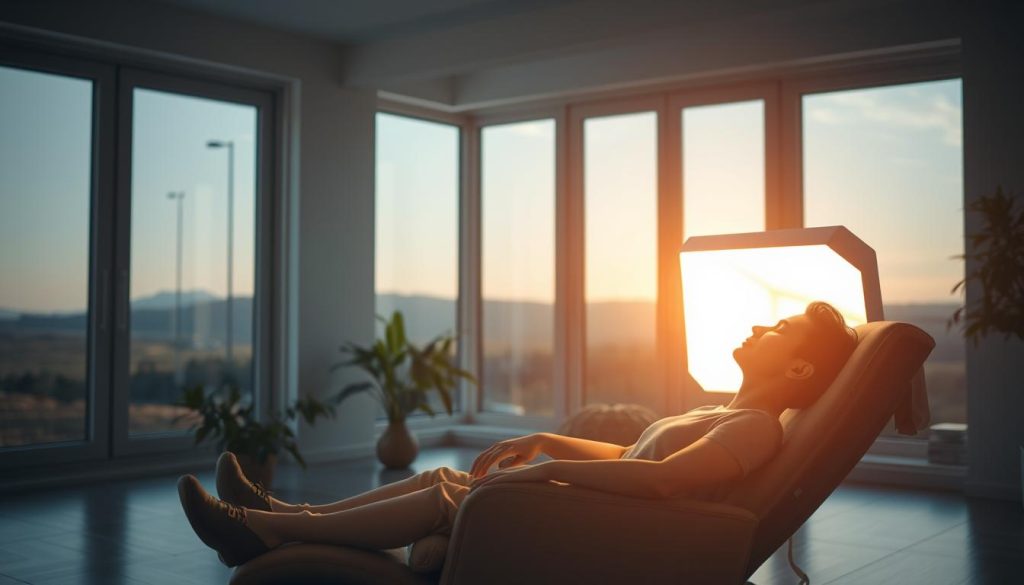Learning about sunlight and our biological clock can change our lives for the better. Our body’s natural rhythm, or circadian rhythm, needs sunlight to work right. Getting enough sunlight helps keep our sleep patterns steady and boosts our energy.
This article shows how sunlight does more than just brighten our day. It helps control our biological clock and improves our health in many ways. Let’s dive into how natural light affects our mood, productivity, and sleep.
Understanding the Biological Clock
The human biological clock is a complex system. It controls daily processes through circadian rhythms. These rhythms help keep us healthy and functioning well.
The Role of Circadian Rhythm
Circadian rhythms are internal cycles that last 24 hours. They manage sleep, hormone release, and metabolism. They sync with light and dark to keep our body clock in check.
This ensures our daily functions run smoothly. It helps us stay healthy and productive.
How the Biological Clock Affects Daily Life
The biological clock impacts our daily lives in many ways. It affects our sleep, energy, mood, and thinking. It also controls when hormones like cortisol and melatonin are released.
It even influences digestion. If these rhythms get out of sync, we face health problems. This shows how crucial it is to keep our body clock in sync.
Natural Light Exposure and Health
Being in natural light is key for our health. It has many benefits, helping our body and mind. Sunlight affects how we feel and function.
The Importance of Sunlight
Sunlight is vital for many reasons. It helps make vitamin D in our skin. This vitamin is crucial for strong bones and a healthy immune system.
It also helps our body clock work better. This improves our sleep and keeps us alert.
Health Benefits of Natural Light Exposure
Natural light does more than just help our bodies. It also boosts our mood and mental health. Sunlight makes us feel better and more focused.
It also lowers the chance of getting SAD, a type of depression. This happens when the seasons change.
Plus, natural light can prevent some chronic diseases. It helps our heart stay healthy and fights inflammation.
The health perks of natural light are clear. It helps make vitamin D, improves our mood, and strengthens our immune system. Sunlight is essential for our well-being.
Sunlight and Biological Clock: The Connection
Sunlight and our circadian rhythm are closely linked, crucial for our health. Our bodies use sunlight to set our sleep and wake cycles. This is key for our daily functions to work well.
Sunlight affects melatonin, the sleep hormone. Morning sunlight tells our brain it’s time to wake up. As the sun sets, our body starts to get ready for sleep.
Sunlight is a key player in our body’s rhythm. It helps us follow the natural day-night cycle. Without enough sunlight, our sleep and mood can suffer.
The science behind sunlight and our bodies is amazing. Natural light helps our brain control important functions. So, getting enough sunlight is essential for a good sleep-wake cycle.
The Function of Melatonin in the Body
Melatonin is known as the ‘sleep hormone.’ It helps keep our sleep-wake cycle in check. The pineal gland makes melatonin when it’s dark, telling our body it’s time to sleep. Knowing how melatonin works can help us sleep better and manage our body’s clock.
How Melatonin Production Works

Melatonin production is mainly affected by light. When it’s dark, our eyes send a signal to the brain. This starts making melatonin, which helps us sleep by cooling our body and making us less alert.
But, light, especially blue light from screens, stops melatonin production. This makes it tough to fall asleep.
The Impact of Melatonin on Sleep-Wake Cycle
Melatonin is key to managing our sleep-wake cycle. High melatonin levels at night help us sleep better. Low levels can make it hard to sleep well, disrupting our sleep pattern.
By controlling light exposure and supporting natural melatonin, we can sleep better. This improves our overall health and well-being.
Regulating Your Body Clock Naturally
Managing your natural body clock means changing your daily habits and routines. It’s key to keep regular sleep hygiene practices. These help keep your circadian rhythm in sync.
One way to align your body clock is to have consistent sleep and wake times. Going to bed and waking up at the same time every day sets a rhythm for your body.
Getting natural light in the morning is also helpful. It tells your body when it’s time to be awake. On the other hand, avoiding artificial light at night helps your body get ready for sleep.
Good sleep hygiene includes a dark, cool bedroom. It also means no caffeine or heavy meals before bed. Relaxing activities before sleep also help.
By making these changes, you can align your internal rhythms with nature. This leads to better sleep and overall health.
The Benefits of Light Therapy
Light therapy is a non-chemical way to help our bodies keep in sync with nature. It’s great for people whose lives or where they live make it hard to get enough natural light. Let’s explore how light therapy can reset your body’s internal clock.
What is Light Therapy?
Light therapy uses artificial light that’s like natural sunlight. It’s meant to make up for when we don’t get enough natural light, like in winter or far north places. The devices used give off bright light, like morning sun, to wake up our bodies.

How Light Therapy Helps Align Rhythms
Using light therapy daily can reset your body’s clock. It helps control melatonin, which is key for sleep. This is especially good for people with SAD and those who work night shifts.
- Facilitates body clock reset, improving sleep quality
- Acts as a non-chemical intervention, minimizing side effects
- Offers a practical solution for combating the winter blues
Light therapy is a simple yet powerful way to improve sleep and well-being. It doesn’t use chemicals. It also boosts mood and energy, helping you live a balanced life.
The Impact of Sunlight on Mood Regulation
Being in natural sunlight is key for our mental health. Sunlight affects our brain chemistry, which is linked to our mood.
Sunlight and Brain Chemistry
Sunlight changes our brain chemistry in big ways. It makes our brain release serotonin, a key mood regulator. More serotonin means better mood and energy.
This shows how important sunlight is for our mental health.
Combating Seasonal Affective Disorder
In fall and winter, many feel Seasonal Affective Disorder (SAD). This is because they get less sunlight, which lowers serotonin. But, more sunlight or light therapy can help.
These methods increase serotonin, fighting off depression and tiredness in the dark months.
Practical Tips for Aligning Your Rhythms to Sunlight
Learning to sync your daily life with sunlight can boost your health. It can help you sleep better and feel more energized. Here’s how to use morning sunlight and cut down on artificial light at night.
Morning Sunlight Exposure
Starting your day with sunlight can change your body’s internal clock. It does more than just wake you up. It helps your body know when to be awake and when to rest.
- Spend at least 30 minutes outside in natural light shortly after waking up to absorb the morning sunlight benefits.
- Consider an outdoor morning exercise to combine physical activity with morning sunlight exposure.
- Position your breakfast table near a window to naturally increase your exposure to daylight.

Avoiding Artificial Light at Night
It’s important to reduce artificial light in the evening for good sleep. Artificial light, especially blue light from screens, can mess with your melatonin levels. It makes your brain think it’s still daytime.
- Dim the lights in your home an hour before bedtime to signal your body that it’s night.
- Use warm, low-intensity bulbs in your bedroom to create a relaxing atmosphere.
- Avoid using electronic devices such as smartphones, tablets, and computers at least two hours before bed, or utilize blue light filters to minimize their impact.
By following these tips, you can cut down on artificial light and sleep better. This can lead to better health and happiness.
Modern Life and Circadian Disruption
In today’s fast world, keeping a healthy circadian rhythm is tough. This part looks at what disrupts our natural rhythms and how to fight it.
The Effect of Screen Time
Digital devices have made screen time a big deal. The blue light they give off messes with our sleep hormones. This can lead to insomnia and other sleep problems.
It’s key to watch how much screen time we have, especially at night. This helps keep our sleep cycles in check.
Managing Work Hours and Light Exposure
Long work hours can mess with our natural rhythms. Using natural light during work hours helps keep our circadian rhythm healthy. Also, less artificial light in the evening helps balance things out.
Here are some tips to reduce circadian disruption:
- Choose natural light over artificial during the day, like taking breaks outside.
- Use dimmer, warmer lights in the evening instead of bright ones.
- Stick to regular work hours to keep your circadian rhythm stable.
By controlling our light and work habits, we can live better with our natural clocks. This boosts our health and happiness.
Sunlight Exposure for Shift Workers
Shift work can be tough, especially when it messes with your light exposure. Working at odd hours can really throw off your body’s natural rhythm. To tackle these issues, it’s key to find good ways to manage light and stick to a routine.
Strategies for Night Shift Workers
For those working at night, it’s important to control light before, during, and after shifts. Start by getting some natural sunlight before your shift. This helps keep your body clock in sync.
During your shift, choose bright indoor lights to stay awake. But, avoid light before bed to help you sleep better.
The Role of Controlled Light Exposure
Light control is vital for shift workers. Use dark curtains in your bedroom to help sleep during the day. Also, think about using lightboxes or lamps in the evening to mimic daylight.
This helps keep your body’s rhythm in check. By doing these things, you can sleep better and feel better overall.
Long-Term Health Impacts of Proper Light Exposure
Knowing how proper light exposure affects our health is key. It helps keep our bodies and minds in top shape. By syncing our body clocks with daylight, we live better and healthier lives. Natural light is a must for a good life.
Good light helps our body clocks work right. This is important for staying healthy and avoiding diseases. It also makes us happier and less stressed, improving our overall happiness.
Using natural light every day makes us live longer and better. It helps us sleep well, think clearly, and feel emotionally stable. By matching our body clocks with daylight, we can live a healthier life. This brings many benefits in the long run.

